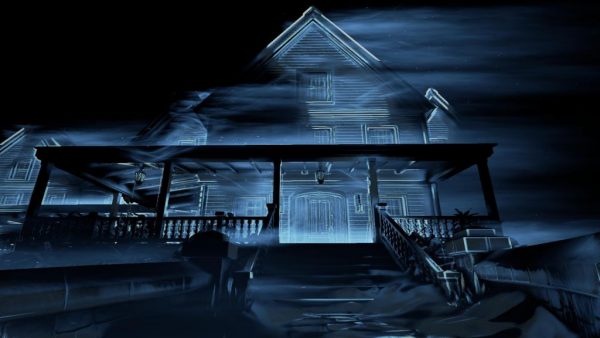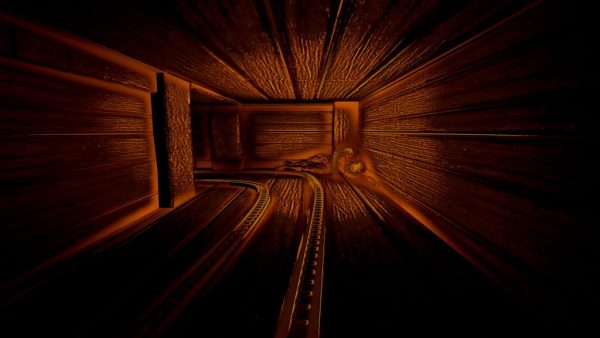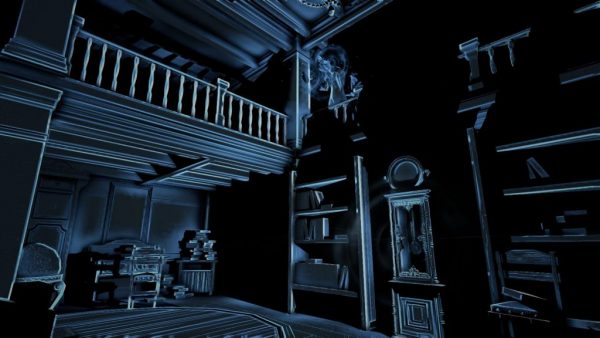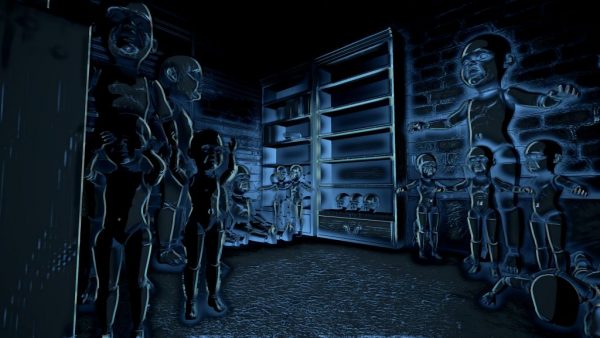Also On: PS4
Publisher: Feardemic
Developer: Deep End Games
Medium: Digital
Players: 1
Online: No
ESRB: M
Matthew Pollesel
As pedigrees go, Perception has a pretty impeccable one: its developer, Deep End Games, was formed by former employees at Visceral and Irrational Games. That means it’s a horror game with direct ties to the likes of Bioshock and Dead Space.
On top of that, it’s got a genuinely unique premise. You’re playing as Cassie, a blind girl, investigating the mystery of a haunted mansion. She navigates around by echolocation, with taps of her cane briefly revealing the world around her. Tap too much, and you risk alerting some of the house’s more malevolent spirits. It’s a neat twist on the genre, and it offers a perspective seldom — if ever — seen in gaming.
Unfortunately, while pedigree and premise provide interesting talking points, they don’t really matter in terms of telling you whether Perception is worth playing. What matters there is execution, and on that front, the game is a little lacking.
Ironically, Perception’s intriguing premise is also its undoing. While the idea of exploring a haunted house using mostly your sense of hearing sounds really cool on paper, in practice that means that you spend most of your time staring at a black TV screen, listening to various spooky noises that are hard to pinpoint. There are a few visual clues — audio files and other interesting artifacts glow, and holding down a button shows you roughly where you need to go — but those only take you so far; it’s easy to get lost and turned around here, and if you reach a point where you have no idea what you’re supposed to do next, the game doesn’t provide you with any kind of hints beyond glowing door frames.
To be fair, I guess that’s kind of the point. If the game is aiming to give players a sense of what it’s like to have impaired vision inside a frightening situation, I suppose you could say it succeeded. But that also doesn’t make for a very interesting experience, at least on a console. At some point, fright just gives way to frustration, and you’re left pressing the echolocation button and hoping you’re not doing it so many times that the house murders you.
It’s not hard to imagine a world in which Perception because a must-play game. After all, the writing isn’t half-bad, and Cassie makes for an appropriately spunky heroine. However, the crucial ingredient would be for the game to be on VR, where it could come closer to its ideal of sensory deprivation to offer a genuinely frightening — rather than frustrating — experience. However, Deep End Games have already nixed that idea, which means that what you’re left with is a whole bunch of frustratingly squandered promise.
Tyler Nethers
Perception was developed by a team of former Irrational Games employees who were behind Bioshock and Bioshock Infinite. The tone here is very different, but retains some of the horror elements of the original Bioshock. You will notice that I call them horror elements, because this truly isn?t a horror game. Perception isn?t entirely sure what it is throughout its 5-6 hours, with horror elements and simulator elements and RPG elements all at work. This does not make the experience bad, but definitely seems to prevent Perception from living up to its full potential.
You enter the world of Perception as Cassie, a young girl who has been blind since birth. Her life thus far seems pretty normal aside from her recent nightmares that have led her to New England in search of a mansion. Perception starts at that mansion, with not a whole lot of backstory to begin with. You will notice that I said Cassie is blind, a mechanic which isn?t really explored in video games much. To move around and ?see? Cassie uses echolocation, be it from her footsteps, her tapping cane or simply with noises in her environment. She uses every sound to her advantage and this lets the player see and interact with the world around them.
The novelty of this wears off after about an hour, with the intriguing mechanic taking a turn from new and unique to stale, and honestly starts to feel like an excuse not to render much of an environment. The mansion has a large amount of potential but ultimately feels like it comes up short due to not being able to explore to the same extent you would in other games.The lack of a diverse color palette, with dull black, grey and blue dominating the player’s sight also begins to wear out its welcome after a time.
The objective of Perception is to find out why Cassie has been drawn to the mansion, what its significance is and eventually how to escape. The story is where Perception truly shines, with solid writing and great voice acting I never felt like it was an afterthought. Every scene in the relatively short game was purposeful and important, with no wasted time or moments. Cassie is the highlight of this, with well timed emotion and great delivery of what the writers intended to be conveyed to the player.
Mechanically is where I really did not know what Perception wanted to be. As I stated above, it is a horror game, an RPG and a walking simulator all wrapped up into one. It never fully sits in one of those categories and unfortunately ends up being sub par in all of them. With the recent popularity of the walking simulator with games like Firewatch being on GOTY lists, Perception seems to be striking while the iron is hot. Unfortunately what makes a game like Firewatch special is the environmental exploration and the wonder and awe that comes with that. Perception is held back by it?s own mechanic and by not allowing you to really see the world around you. I understand the game is about a blind girl and that blindness is what drives the game, but I think there was a lot of room to use that to their advantage that was missed.
The horror elements rely on cheap jump scares that ONLY work because you are blind, and the late game introduction of The Presence. The Presence is a spirit that will come and kill you if you make to much noise and give yourself away. Rather than present a frightening challenge, this presents a frustrating obstacle in a game where you literally have to make noise to get around and ?see? the world.
Perception comes to a close with a worthy ending, wrapping up the story nicely and relatively quickly. It never becomes so difficult that you do not want to go on, but it becomes bland and repetitive prior to the halfway point. I think that the vision of Perception and the final product are two very different things and feel like a desire to spread focus across different mechanics and genres ended up hindering Perception in the long run. All in all the game is worth playing, but maybe wait for it to go on sale.





